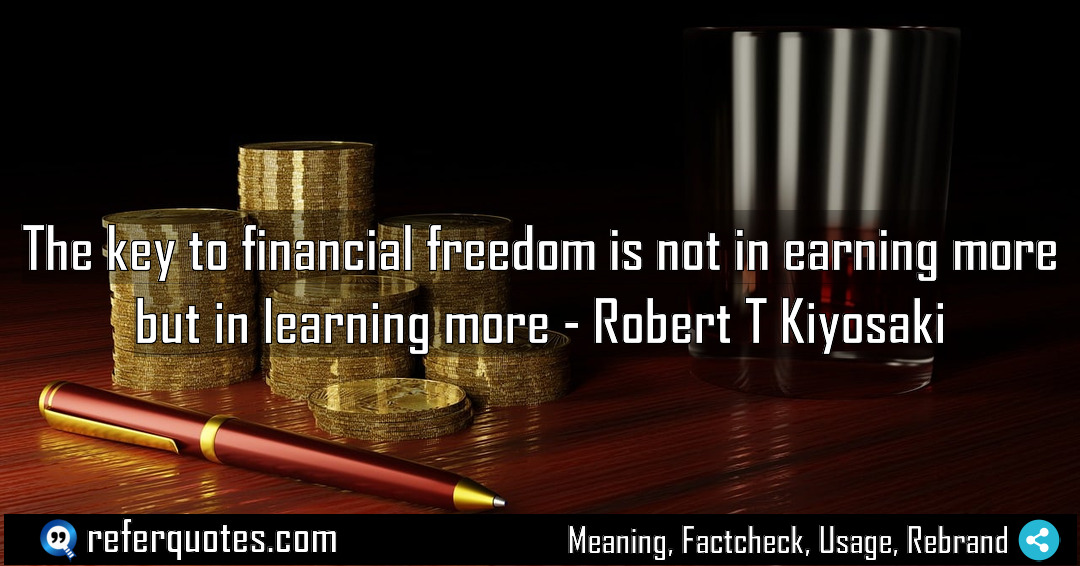
You know, “The key to financial freedom is not in earning more” really hits home. It’s not about the size of your paycheck, but the depth of your financial understanding. This shifts the entire game from pure effort to strategic intelligence.
Share Image Quote:
Table of Contents
Meaning
The core message is simple but profound: Financial intelligence, not just income, is the real lever for wealth.
Explanation
Look, I’ve seen it a thousand times. People chase raises, they chase promotions, they chase that next big side hustle. And that’s great, don’t get me wrong. But they’re just pouring water into a bucket full of holes if they don’t understand how money works. The “learning more” Kiyosaki talks about isn’t academic. It’s the gritty, real-world knowledge of cash flow, assets versus liabilities, and tax strategies. It’s the difference between working for money and having your money work for you. Once that clicks, everything changes.
Quote Summary
Reading Level60
Aesthetic Score80
Origin & Factcheck
This quote comes straight from Robert Kiyosaki’s 2017 book, Why the Rich Are Getting Richer. It’s a core tenet of his philosophy. You sometimes see similar sentiments misattributed to other finance gurus, but this phrasing and the underlying emphasis on financial education is pure Kiyosaki.
Attribution Summary
Author Bio
Born in Hilo, Hawaii, Robert T. Kiyosaki graduated from the United States Merchant Marine Academy and served as a Marine Corps helicopter gunship pilot in Vietnam. After stints at Xerox and entrepreneurial ventures, he turned to financial education, co-authoring Rich Dad Poor Dad in 1997 and launching the Rich Dad brand. He invests in real estate and commodities and hosts the Rich Dad Radio Show. The Robert T. Kiyosaki book list spans personal finance classics like Cashflow Quadrant and Rich Dad’s Guide to Investing, along with educational games and seminars.
| Official Website | Facebook | X| Instagram | YouTube
Where is this quotation located?
| Quotation | The key to financial freedom is not in earning more but in learning more |
| Book Details | Publication Year/Date: 2017, ISBN/Unique Identifier: 9781612680811, Last edition: 1st Edition, Number of pages: 256 |
| Where is it? | Chapter 7, Learning Equals Freedom, page 126 |
Context
In the book, he’s making a stark contrast. He argues that the old advice—”go to school, get a good job, save money”—is fundamentally broken. He positions “learning more” as the new, essential form of education, one focused on investing, debt management, and building systems that generate wealth independently of your time.
Usage Examples
So how do you actually use this? Let me give you a couple of scenarios.
- For the high-earning professional: You’re making great money but it all seems to disappear. Instead of asking for another raise, the play is to learn about asset allocation. Take that extra income and learn how to put it into cash-flowing real estate or a diversified stock portfolio. You’re shifting from an earner to an owner.
- For someone feeling stuck: If you’re living paycheck to paycheck, the instinct is to find a second job. But what if you used that time to, say, learn a high-value digital skill like copywriting or SEO? That’s “learning more” that directly increases your earning potential, not just your hours worked.
- For young graduates: The best advice isn’t just “start saving.” It’s “start learning about compound interest and index funds now.” A little knowledge early on is more powerful than a lot of money later.
To whom it appeals?
Share This Quote Image & Motivate
Motivation Score88
Popularity Score86
Shareability Score82
Common Questions
Question: So does this mean I shouldn’t try to earn more money?
Answer: Not at all! Earning more is fantastic fuel. But without the knowledge of what to do with it, that fuel can just evaporate or, worse, fund a lifestyle that keeps you on the treadmill. Knowledge is the engine that turns that fuel into lasting momentum.
Question: What kind of “learning” is he talking about?
Answer: He’s talking about financial education. Think practical stuff: understanding how to read a balance sheet, the power of using debt to acquire assets (like a rental property), how taxes work for investors versus employees, and the different types of income (earned, portfolio, passive).
Question: Isn’t this just an oversimplification?
Answer: It’s a principle, not a full-blown plan. It’s the starting point. Of course, you need action and discipline. But this idea re-frames the entire problem. It moves the goalpost from “I need a bigger paycheck” to “I need a smarter financial strategy,” which is a much more powerful position to be in.
Similar Quotes
You know, “The more passive income you build, the more freedom you gain” is one of those quotes that sounds simple but is absolutely transformative when you live it. It’s…
You know, when Kiyosaki said “Financial education is not about getting a job,” he was really onto something. It’s a complete mindset shift from being an employee to becoming a…
You know, the path to wealth is to learn how to make money work for you. It’s the fundamental shift from trading your time for cash to building systems that…
You know, the more you depend on a paycheck, the less financial freedom you have… it’s a simple but brutal truth. It’s not about the money itself, but about the…
Wealth is not measured in money but in freedom. This quote flips the script on what it means to be truly rich. It’s not about the number in your bank…
